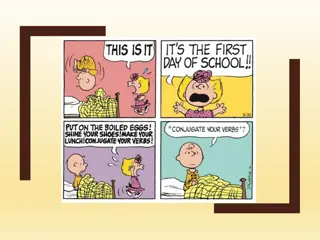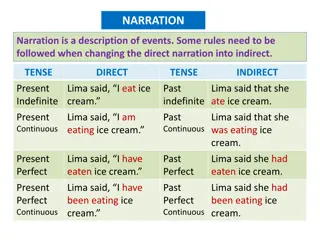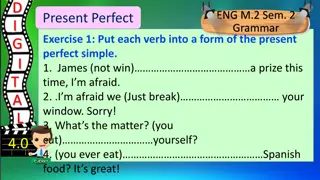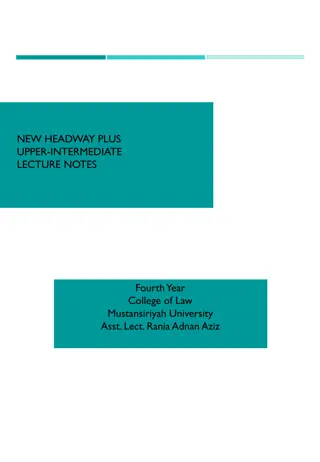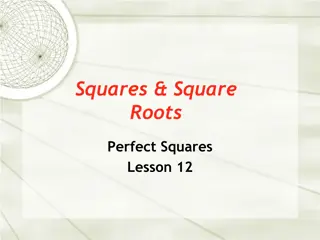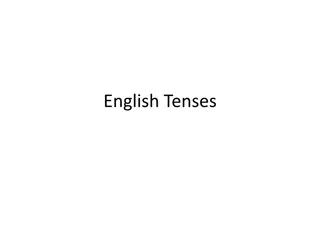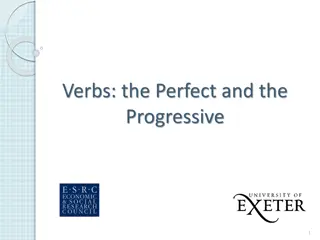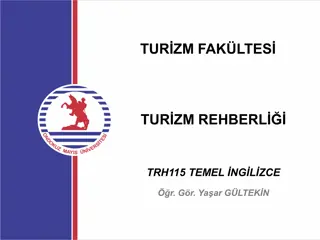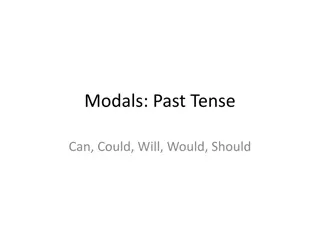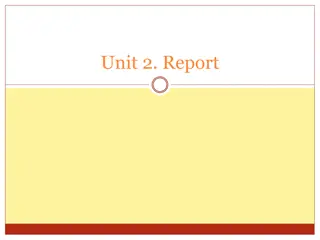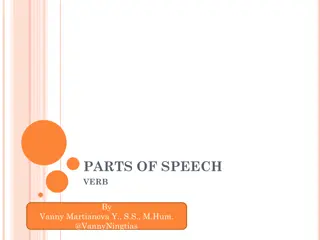
Perfect Modals: How to Use Must Have Done, Can't Have Done, Should Have Done, and Could Have Done
Explore the usage of perfect modals with examples from Katrina Ann Read, covering expressions like "must have done" for logical conclusions, "can't have done" for logical negatives, "should have done" for regret or advice, and "could have done" for possibilities. Enhance your understanding of these modal verbs in English grammar.
Download Presentation

Please find below an Image/Link to download the presentation.
The content on the website is provided AS IS for your information and personal use only. It may not be sold, licensed, or shared on other websites without obtaining consent from the author. If you encounter any issues during the download, it is possible that the publisher has removed the file from their server.
You are allowed to download the files provided on this website for personal or commercial use, subject to the condition that they are used lawfully. All files are the property of their respective owners.
The content on the website is provided AS IS for your information and personal use only. It may not be sold, licensed, or shared on other websites without obtaining consent from the author.
E N D
Presentation Transcript
PERFECT MODALS Katrina Ann Read
Structure Modal verb + have + past participle Katrina Ann Read
MUST HAVE DONE ? Katrina Ann Read
Must have done It is used to describe something which is a logical conclusion conclusion based on the information available. logical "Where is Mary?" "Her coat has gone, so she must have left must have left the building." Katrina Ann Read
CAN'T HAVE DONE ? Katrina Ann Read
Can't have done It is used to describe something which is a logical logical negative negative conclusion conclusion based on the information available. "Where is Mary?" "Her coat is still here, so she can't have building." can't have left left the Katrina Ann Read
SHOULD HAVE DONE ? Katrina Ann Read
Should(n't) have done It is used to talk about things we regret good/bad idea in the past (advice for the past) good/bad idea in the past (advice for the past) regret or thought was a I should have should have studied than I expected. He shouldn't have argued shouldn't have argued with the professor, now he'll have to apologise. studied the grammar, the exam was harder Katrina Ann Read
Should(n't) have done It is used to talk about something we think has already happened (in a normal situation), but we're not sure (often used with "by now"): "Shall we revise the future continuous? Your professor should have have taught taught you that by now." (if the lessons are on schedule, this grammar point has been presented) Mary should have arrived should have arrived by now, but she's late. should Katrina Ann Read
COULD HAVE DONE ? Katrina Ann Read
Could have done It is used to indicate something was possible in the past, you had the opportunity or ability to do something: I could have passed the exam, but I overslept and missed it. Peter could have bought the book, but he borrowed it from the library instead. I could have gone to the party, but I stayed at home chatting with friends Katrina Ann Read
Couldn't have done It indicates that something wasn't possible in the past, even if you had wanted it: I couldn't have passed the exam, I hadn't studied part 2 yet. He couldn't have arrived earlier, the coach broke down on the motorway and he had no other way of getting here. Katrina Ann Read
? MAY / MIGHT HAVE DONE Katrina Ann Read
Might/may (not) have done It is used to make a guess make a guess about a past situation, we don't know if the situation is true or not. "Why didn't the teacher give us the test results yesterday?" "He might have forgotten to." OR "He might not have finished marking the tests." (COULD HAVE DONE can be used in the affirmative thing) affirmative for the same (COULD HAVE DONE Katrina Ann Read
? WOULD HAVE DONE Katrina Ann Read
Would have done It is used in the third conditional If I had known about the meeting, I would have come. It can be used with the if part only implied "Nobody came to the meeting." "Oh no, I'm so sorry! I would have come." (this implies "if I had been able to") Katrina Ann Read






